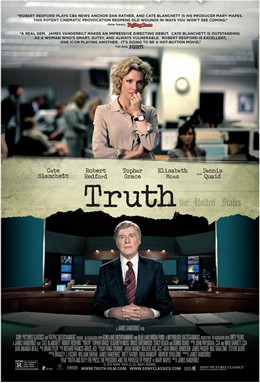
Truth, written and directed by James Vanderbilt, tells the story of the widely criticized CBS News report about Bush’s National Guard service. The controversy around the report resulted in several people losing their jobs, and it forced Dan Rather into early retirement.
Mary Mapes (Cate Blanchett) is a producer for CBS News. She organizes an investigation into Bush’s National Guard service during the 1970’s, specifically as to whether he received preferential treatment and whether he went AWOL at one point. Mapes is contacted by a former National Guard officer, Bill Burkett (Stacy Keach), who gives her documents allegedly written by a now deceased National Guard officer, which are highly critical of Bush. The documents are used in a 60 Minutes report. Almost immediately, the Internet is flooded with accusations that the documents are forged.
I found Truth to be an intelligent and compelling drama, despite some hokey moments. The acting is quite good; Cate Blanchett is affecting as Mapes. However, there were some things about the film that bothered me. In particular, I was struck by the fact that Vanderbilt goes out of his way to depict Bill Burkett in a sympathetic light, despite the fact the he lied to Mapes about how he obtained the documents. This seems odd, especially since there is very good reason to believe that Burkett may have been the one who forged the documents. The paper trail ends with Burkett, and he possessed the necessary knowledge to write the documents. Also the film doesn’t mention that Burkett was an outspoken critic of Bush before he produced the documents, which was something that Mapes must have been aware of.
In one scene, a character makes a speech about corporate control of the news media. Although I think corporate control is a problem, I don’t think it has any bearing on this incident, and the film doesn’t make a convincing case that it does.
Truth does make a valid point that the pressure of deadlines can lead reporters to make unwise decisions. However, I think Mapes should have known better than to use the documents from Burkett in the report.
In my opinion, the The New York Times’s coverage of Iraq during the build-up to the Iraq war was far more egregious than what Mapes and CBS News did, since it created support for an illegal war. Yet only one person there, Judith Miller, lost her job because of it. I think this says something about the media’s priorities.

